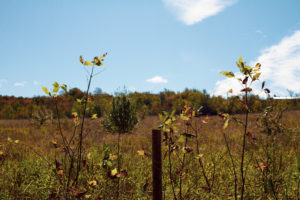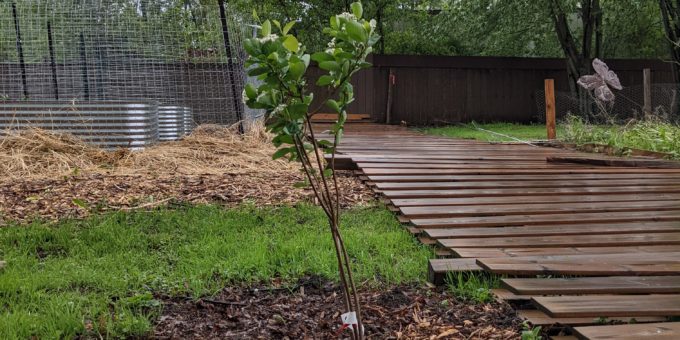
We’re not preppers; at least not in the way you see portrayed in the movies. There is no bunker, no weapons, and no stockpile of MREs waiting for that glorious I-told-you-so moment when SHTF. Our leftist, pacifist worldview doesn’t vibe well with the conspiracy theory driven panic you see on survivalist forums. Despite this, we know it just makes sense to be able to take care of ourselves and our community during and after a disaster. On May 21st 2022, we got our chance to see how prepared we really are.
Emergency Alerts and Taking Shelter
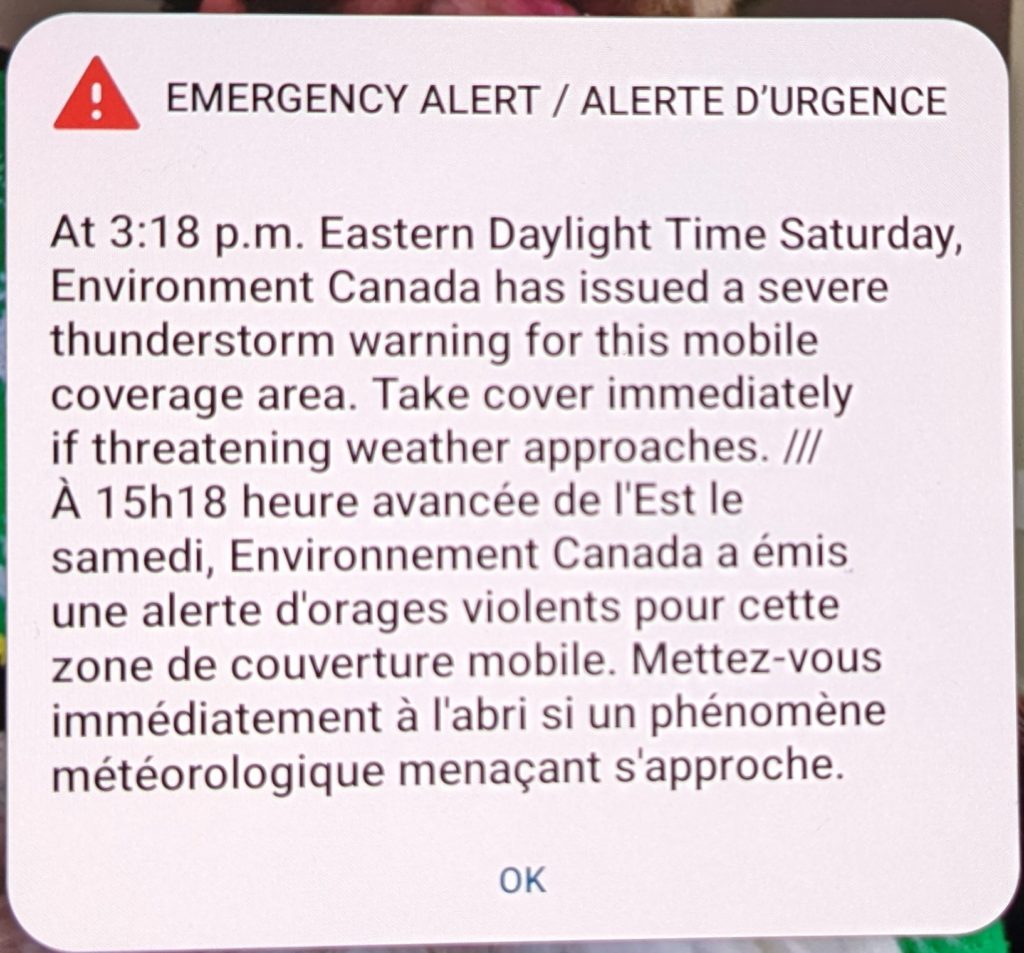
We got an emergency alert on our phones at 15:18, which was about half an hour before the storm had actually hit us. T was hanging out on the couch, reading and chatting with family in the GTA, who mentioned getting stuck in a power outage at a grocery store about an hour earlier. The power started to flicker, so she went to unplug her desktop computer. It wasn’t until H saw the back fence blow away that we realized how serious it was, and took shelter in the basement.
Storm impact
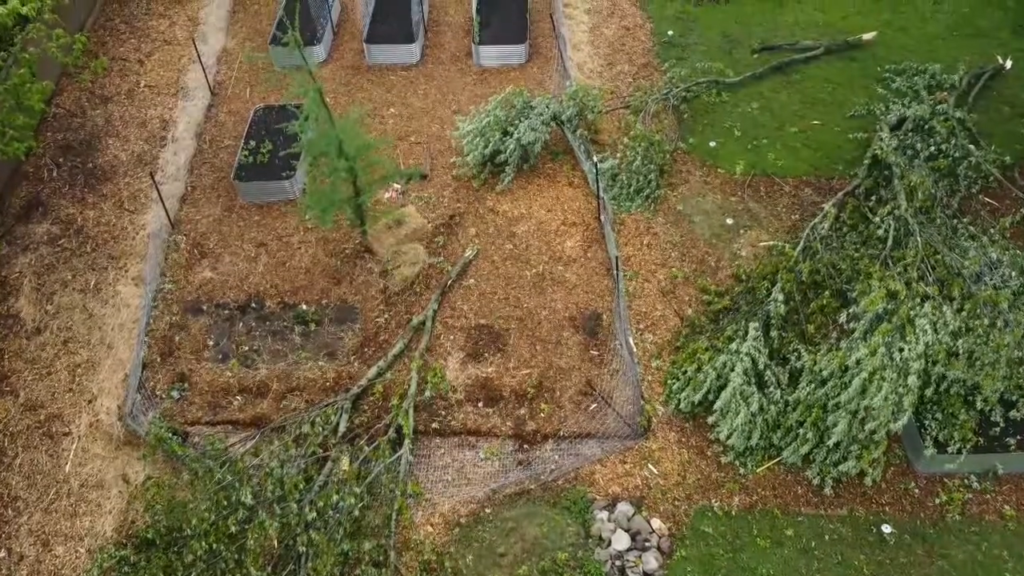
While sheltering in the basement our neighbor texted us asking if our car was damaged. A tree in his front yard broke and fell into the driveway, narrowly missing the car. All of our trees survived, but the giant silver maple in the back lost some significant limbs.
We and the cats were shaken up, but okay. The house and car had no damage, but the back fence between the neighbor and ourselves as well as the garden fence were both hit. Limbs fell onto the raised beds, denting them slightly and wiping out quite a few seedlings.
We got extremely lucky. Winds in the area reached 190 km/hr, and there was widespread destruction. The main roads in the area were littered with hydro poles, power lines and giant trees that were taken out. We were without power for 75 hours, and a week later there are still folks in the area who are not back up and running. At least 11 people died in this storm, mostly from falling trees.
What we did right
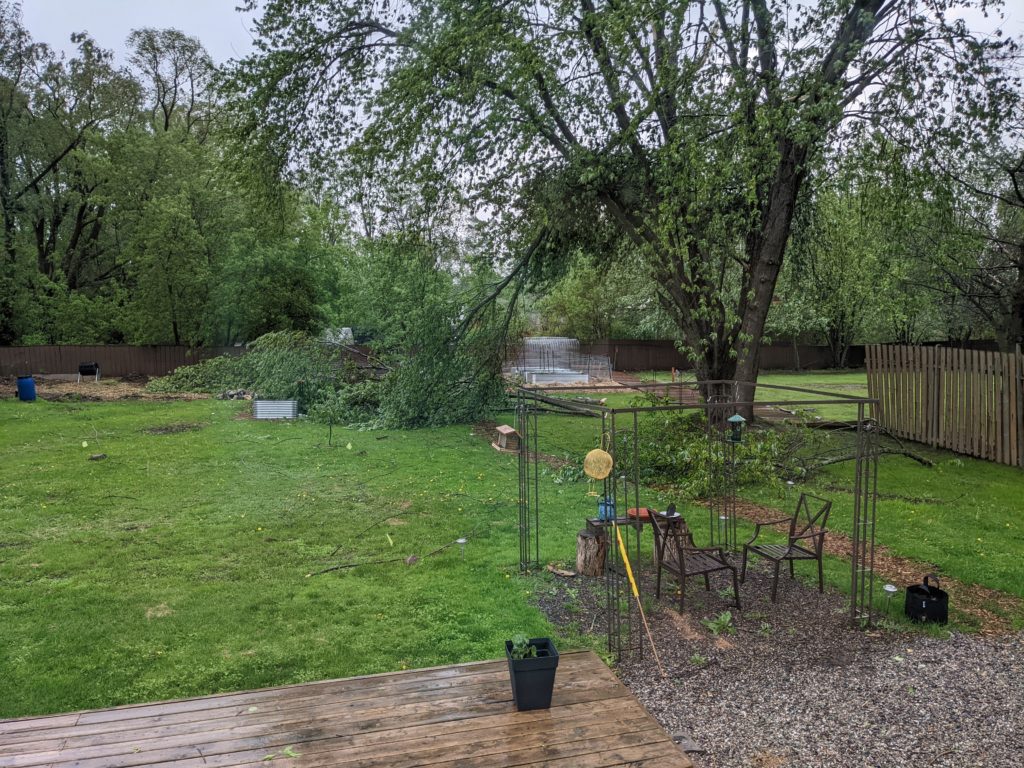
- Installed a battery back up for the groundwater sump pumps – It’s a separate smaller pump that alarms when it runs, but it protected our basement from flooding. It would have been a whole other ball game if we needed to deal with a basement flood during this event.
- Had bottled water on hand – We’re on a well: no power = no water. We keep water bottles in the basement to meet our hydration and basic hygiene needs.
- Had the ability to cook outside – There was propane in the BBQ and we have a small camping burner and fuel (Jetboil system).
- Had flashlights and candles – We were able to see in the house at night!
- Had some battery packs that could be used to charge items that take power via USB – This would allow us to store power.
- Had a texting/friendly relationship with one of the neighbors – He kindly offered to let us plug into his generator a few times to charge our sump and provide some cooling to the fridge/freezer.
- Dug a stormwater pond in the backyard – This is a work in progress, but allowed us to store storm water after an event. We used that water to flush the toilet and also water our seedlings.
- Kept fuel in the car – We were lucky to have a full tank. Gas shortages were experienced in the area as many stations did not have fuel.
Areas for improvement
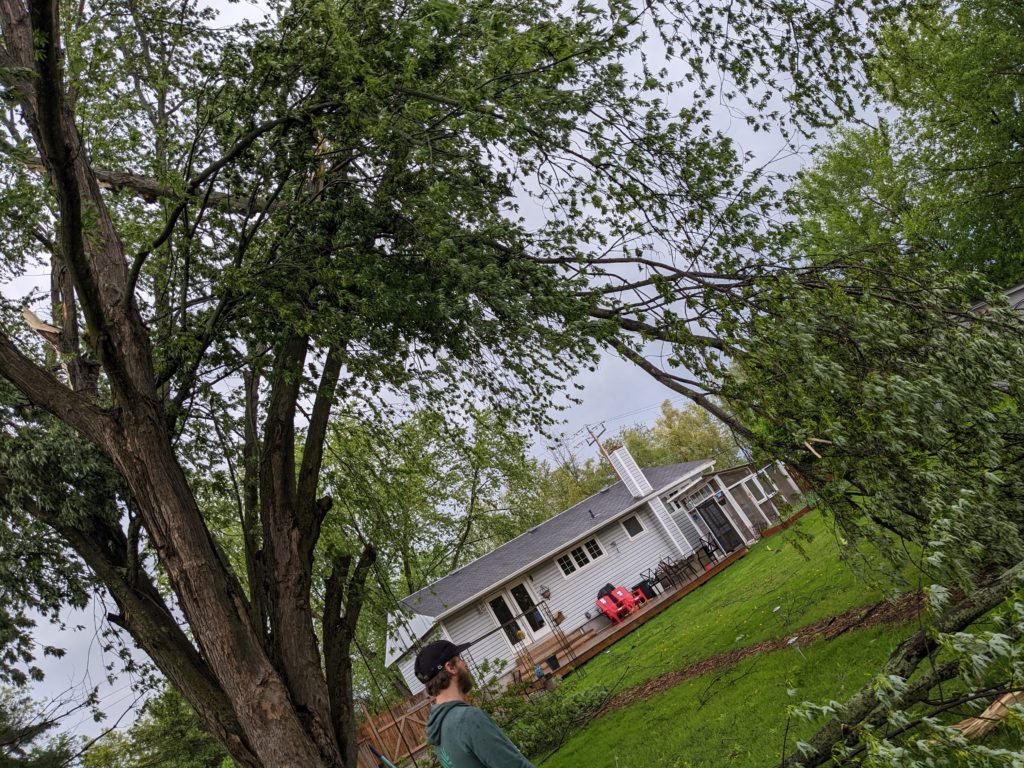
- Take emergency alerts more seriously – The alert said to take cover if threatening weather approaches, which seemed very vague an non urgent. The event hit us so fast, there was no “threatening weather approaches” phase. In some areas nearby people posted photos of the sky turning green and menacing, but we didn’t see that at our house. Next time, we will get the cats in their carriers if we receive an alert, and be ready to head into the basement (or head there preemptively).
- Keep at least some of the emergency gear in the basement – When we were sheltering down there, we were sitting on the cold basement floor, shivering. Even though the basement is unfinished, we need to keep some sort of seating as well as an actual emergency kit down there. We have many of the items, but they are spread out throughout the house. Trying to find them during an emergency is a challenge and wastes time.
- Keep more water and other beverages – Thankfully, there was power in some pockets of the city and we were able to get more water and Gatorade to tide us over. We have increased the amount of water we store and will likely pressure can some water for emergency use as well.
- Have the ability to clean water – We have been planning to buy a water filter for back country camping later this year, but we will buy it sooner than later. We had tablets to purify, but in our area we really need the filter step too. I suppose we could have used cloth in a real pinch but I will feel better with the filter on hand.
- Get a generator – Our main loads will be the sump pumps, the fridge/freezer, heaters in winter, and the ability to charge phones. Powering the well seems unrealistic due to budget – but we need to do some research before we take the plunge. Further, it is impossible to find a generator locally right now as the widespread nature of the outages made them a hot item.
- Have more ready to eat or low prep foods on hand – We lived off veggie burgers that we grilled, but we were only able to do that because the neighbor let us plug our freezer in periodically. We were also able to go shopping and grab some fast food as places started to get power. If we didn’t have that we would have had to throw out all of the food in the freezer after about 48 hours. We need to ensure we have food that can be eaten cold or that only needs hot water. We will be making sure to can ready to eat things (baked beans, veggies, etc) in addition to simply canning ingredients.
- Get a radio – We lost cell service for hours at a time. SMS would work with delays, but calls were iffy and we couldn’t use data. T got texted into work the day after the event and it was very scary to go out into the world without knowing what awaited her on the roads. Having a battery or crank powered radio to listen to the news would have been extremally useful.
- Get to know the neighbors more – We met one more neighbor during the event as we walked along our street. We exchanged numbers and texted each other offering what we could (supplies, labour). We truly believe that the lone survivalist idea is folly, and community is required to get though events like this, especially in rural environments. We look forward to fostering relationships with those around us.
This storm was a huge wake up call. We experienced a few outages in our time at this house, but nothing this widespread or large. We are grateful to have come out with really minimal damages and we have a much better idea of where we need to be going forward to handle extreme storm and other impacts of climate change.

